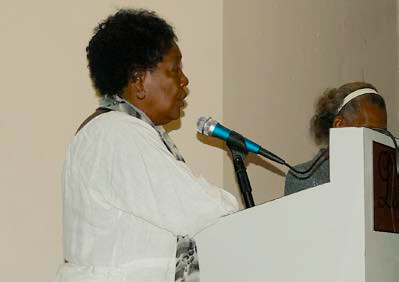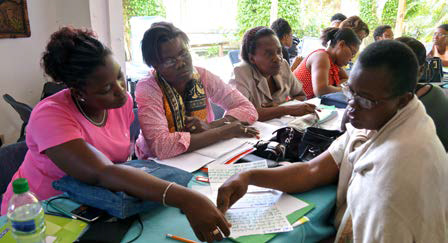
Needing to increase the number of health facilities served from 12 to 17 in FY15 had the SPRING/Haiti project asking an important question: How was the project's small technical staff going to reach 17 health facilities located in 9 departments to strengthen the nutrition assessment, counseling, and support (NACS) continuum of care?
Strengthening the NACS approach in 17 secondary and tertiary health facilities in 9 of Haiti's 10 departments is SPRING/Haiti's primary objective. The experiences gained during FY13 and FY14 taught the team an important lesson: the Ministry of Health (MOH) and SPRING/Haiti are essential allies in building stronger programs and obtaining better results.
With this in mind, SPRING/Haiti met with Dr. Joseline Marhône Pierre, MOH nutrition director, to brainstorm the NACS approach, what we hoped to achieve, and the most efficient way to achieve it. This activity was critical because it opened the door to an engaging professional collaboration. It became clear that the departmental nutrition focal point (NFP) agents were SPRING/Haiti's necessary extension to reach the 17 target sites.
As a result, Dr. Marhône Pierre informed the nutrition focal points that SPRING/Haiti was an important MOH collaborating partner, and she was counting on their support to reach to the 17 target sites to help reinforce the continuum of care. She emphasized how important it is for the SPRING/Haiti-supported target sites to understand why nutrition matters and to become NACS-competent sites.
Most importantly, Dr. Marhône Pierre emphasized that the NFPs should apply the NACS approach to the other MOH-supported health centers within their coverage area as well.
She added that it is important to think about the continuity of care for all of Haiti.
SPRING/Haiti's technical assistance to the health facilities is two-fold. SPRING/Haiti's support allows the MOH to reach where the MOH cannot be.
—MOH nutrition director, September 2014

The positive results of this approach are already evident. The NFPs and SPRING/Haiti staff co-facilitated three nutrition assessment and referral trainings and two counseling trainings. They have paired up to facilitate nutrition assessment and counseling sessions. Quarterly, the partners are conducting formative supervision visits to ensure that health providers are correctly assessing nutritional status, providing nutrition counseling, referring clients for additional care and support within the health facility and or the community, and treating moderate and severe malnutrition.
The NFPs have also begun to verify data quality and how the quality improvement teams are progressing, and are conducting trainings in community-based management of acute malnutrition.
SPRING/Haiti is also providing technical leadership and logistical support to the MOH to reinforce a fruitful collaboration. Although SPRING's work in Haiti will close at the end of September 2015, mechanisms are now in place for the continuation of NACS services strengthening throughout the country, further supporting USAID's goal to improve the country's health system in order to expand access to quality healthcare.
SPRING/Haiti understood early on that the nutrition focal point (NFP) agents were an essential connection with the target sites. The collaboration between SPRING/Haiti and the NFPs ensures a much needed bridge between the MOH, the health facilities, and the SPRING/Haiti project.
—Miss Rhudnie Angrand, departmental nutrition focal point, North region